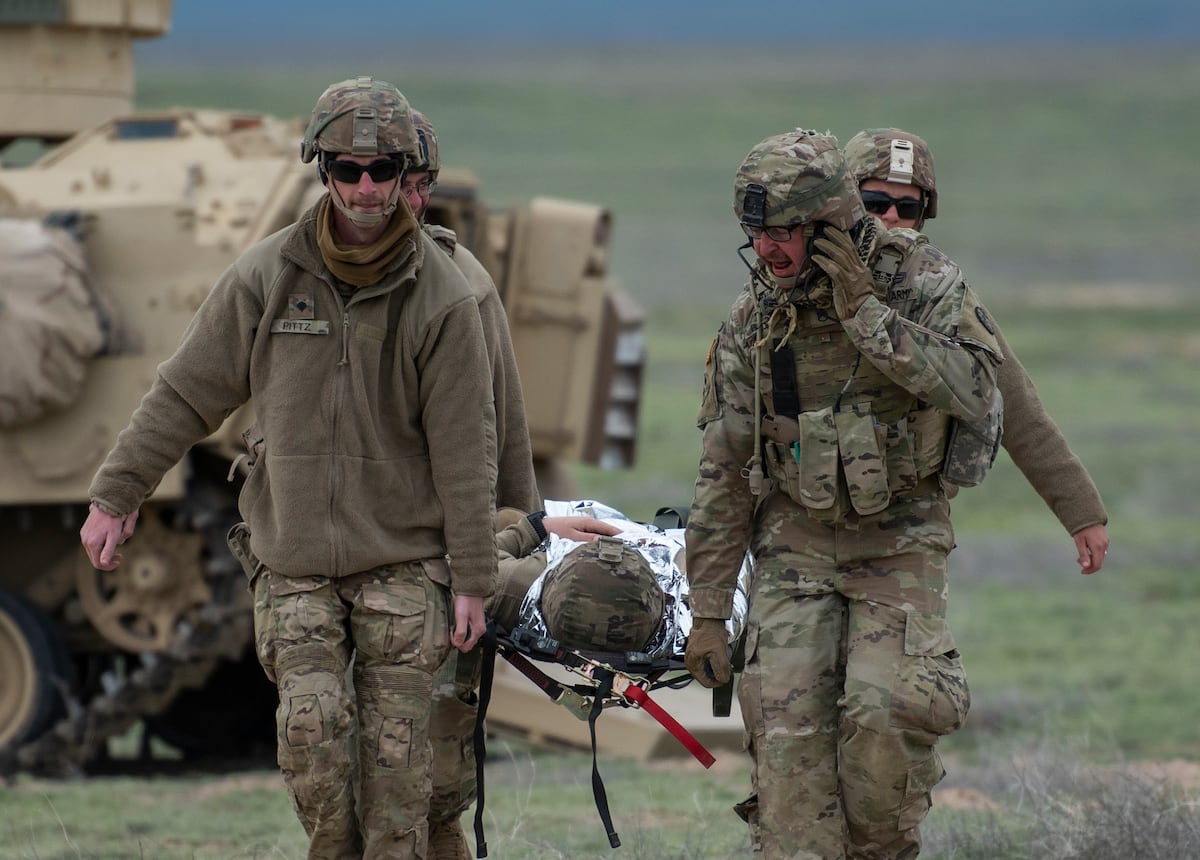When it comes to combat casualty care, “without urgent intervention, the Military Health System will continue to slide into medical obsolescence,” a retired Air Force trauma surgeon told senators Tuesday.
The consequence of a military medical system that’s unprepared to handle a high volume of casualties in any future major conflict is that “many will have survivable injuries, yet one in four will die at the hands of an unprepared system,” said Dr. Jeremy W. Cannon, a professor of surgery at the University of Pennsylvania’s Perelman School of Medicine and a surgeon in the Philadelphia Veterans Affairs Medical Center.
Only about 10% of military general surgeons experience the patient volume, level of acute cases and variety of cases needed to remain designated as combat ready. According to Sen. Roger Wicker, R-Miss., chairman of the Senate Armed Services Committee, the percentage of military general surgeons meeting the necessary readiness standards dropped from 17% in 2015 to 10% in 2019.
“We’re actively falling into the trap of the peacetime effect,” Cannon, a retired Air Force colonel, told members of the Senate Armed Services Committee.
That 10% is caused by “grossly inadequate patient volume,” Cannon said. “They’re not doing the cases, not doing the procedures. They’re not doing what they were trained to do. That’s because they don’t have the patients in the facilities.”
He and two other military retirees who rose to high-ranking positions in the military medical establishment testified Tuesday about ways to prepare the military’s surge capacity, including the need to invest in Level 1 trauma centers for military medical facilities.
“We’ve de-scoped our facilities to the point where they take care of low-acuity community hospital patients, not trauma patients,” said retired Air Force Maj. Gen. Paul A. Friedrichs, the former Joint Staff Surgeon. “We need our key hospitals to be Level 1 trauma centers in partnership with the American College of Surgeons in the communities where they’re located.” To do so, there must be adequate funding, he said.
There’s no way to fix the problems without adequate funding, the witnesses said. It’s a mistake to think military medical care could be provided at a lower cost than in the civilian sector and still be ready for conflict, Friedrichs added.
Costs of medical care nationwide have risen about 5.1% per year, on average, since 1938, Friedrichs said. But since 2015, the budget for military hospitals has decreased by nearly 12%, according to Wicker, the committee chair.
The military medical system has been working to attract patients back to the military treatment facilities after forcing many military beneficiaries to seek care in the private sector.
RELATED
“We need our military medics taking care of sick patients,” Friedrichs said. There’s a comparison, for example, between taking care of a bladder cancer patient who needs to have their bladder removed, and someone with a gunshot wound to the abdomen who needs to have the bladder reconstructed, he explained.
Meanwhile, military facilities must be fully staffed, said retired Air Force Lt. Gen. Douglas J. F, who served as the first director of the Defense Health Agency. That includes the full spectrum of support for critical care hospitals. Robb suggested the military also work more with Veterans Affairs and civilian medical facilities, so military surgeons could work more cases that would bolster their combat readiness.
Instead of duplicating efforts, the Military Health System needs to work with Veterans Affairs facilities, said Friedrichs, who commanded a DOD-VA joint venture in Anchorage, Alaska. There, he said patients “were taken care of by a joint team. It was far more efficient than building duplicative adjacent facilities. Instead, we built integrated adjacent facilities.”
Friedrichs noted there is $10 billion of unfunded facility needs in DOD and $100 billion in VA. There are opportunities to bring patients with acute care needs from the VA into DOD facilities, or bring DOD medical personnel into VA medical facilities, he said, “so that we are not wasting money on duplicative buildings and instead focusing our resources on the patients who need our care.”
It’s critical, Friedrichs added, that medics are clearly defined as being part of the joint military. “As long as we preserve this false narrative that the Military Health System is separate and not covered by the same expectation of jointness as the rest of the military, we’re going to continue to have these fruitless bureaucratic buffoonery actions that distract us from taking care of patients,” he said.
A root problem, Cannon said, is that no one within the DOD truly owns combat casualty care. He recommended that Congress establish clear leadership on that front.
Wicker acknowledged the importance to troops of there being enough combat-ready surgeons.
“We know that troops in combat are more comfortable taking the risks necessary to accomplish their mission if they have confidence in military doctors,” Wicker said.
Karen has covered military families, quality of life and consumer issues for Military Times for more than 30 years, and is co-author of a chapter on media coverage of military families in the book “A Battle Plan for Supporting Military Families.” She previously worked for newspapers in Guam, Norfolk, Jacksonville, Fla., and Athens, Ga.
Read the full article here








